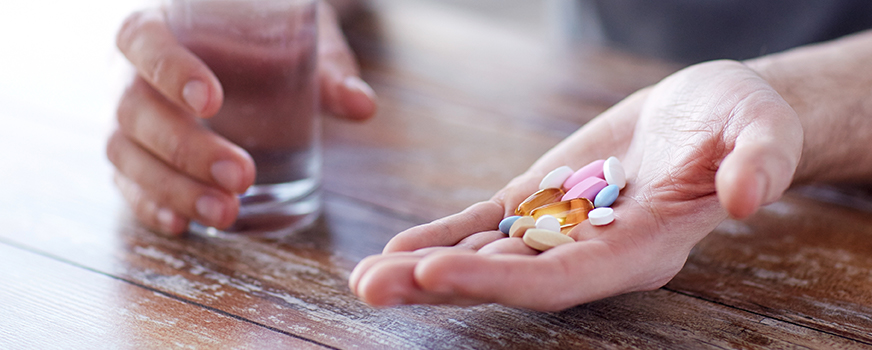
Though fertility is a complicated subject, there are things you can do at home that may help boost fertility naturally. Because fertility is a complex equation, and each person’s body is different, the science around micronutrients and conception is still being researched to learn more about their effect on fertility. That said, some promising studies have begun to shed light on the role of vitamins in getting and staying pregnant.
Vitamins play important roles in female health. They’re essential for many functions, including:
- Menstruation
- Ovulation
- Thyroid function
- Energy production
- Immune function
- Egg quality and maturation
Adequate vitamin and mineral intake is critical when trying to create the right environment for a healthy pregnancy. Some nutrients may even reduce symptoms of polycystic ovarian syndrome (PCOS), a common underlying cause of infertility. For men, some fertility supplements can help increase sperm motility Check out this list of vitamins and supplements that may help support you and your health during your fertility journey!

Vitamins for Fertility
Folic Acid
This B-vitamin, in addition to improving blood flow, prevents elevated blood pressure and has benefits for both fertility and pregnancy. Folate supplementation prior to conception has been associated with a greater chance for getting pregnant and improved success with fertility treatments. Once pregnant, folic acid has also been shown to prevent some fetal abnormalities, such as neural tube defects.
Vitamin A
Vitamin A is vital for normal vision, immune system health, and reproduction. Vitamin A also supports many parts of the body like the heart, lungs, and other organs. Research has shown that Vitamin A is essential for reproduction in both males and females. Other studies have shown that supplementing vitamin A can improve egg quality, ovarian response, implantation, embryonic development, and placental function.
Vitamins B-1, B-2, B-3, B-6, and B-12
A large, long-running public health study has shown that a higher intake of fertility vitamins B-1, B-2, B-3, B-6, and B-12 was associated with lower risk of ovulatory infertility. Some studies have linked low levels of vitamin B-12 with female infertility, and having higher levels of B-12 and folate may enhance fertility in women undergoing infertility treatment. For male infertility, more research is needed, but some speculate B vitamins might help improve sperm quality as well.
Vitamin C
Vitamin C is a powerful antioxidant that can reduce cellular damage throughout the body, as well as increase iron absorption. This antioxidant also stimulates nitric oxide production. A 2016 review of multiple studies found that taking vitamin C with vitamin E improved the number, mobility, and sometimes DNA integrity (or quality) of sperm in men.
Vitamin D
Some studies have linked a deficiency of vitamin D, to infertility in women. A 2019 analysis found low levels of vitamin D in women who struggled with infertility due to polycystic ovarian syndrome. Vitamin D plays essential roles in both female and male reproductive function, as research has shown that vitamin D deficiency may be associated with infertility in both men and women.

Supplements for Fertility
Acetyl L-carnitine
This supplement is a form of the amino acid L-carnitine (LC), which occurs naturally in the body and helps turn fat into energy. ALC is a powerful antioxidant and is believed to slow age-related changes in the female reproductive system. Studies have shown that the inclusion of ALC supplements improved symptoms of PCOS, endometriosis, amenorrhea, and sperm motility in men.
Calcium
Research isn’t definitive that extra calcium boosts fertility. But it’s important for both men and women to get enough of this mineral to prevent deficiencies. A 2019 study found that calcium deficiency could be a cause of infertility in men, since calcium is involved in the production of sperm. Unless you’re deficient in this mineral, it’s best to get your calcium from healthy dietary sources like full fat yogurt, not supplements.
Co-Q10
This coenzyme is critical to cellular energy production. Your body produces this on its own, but increasing the amount in your body may have fertility benefits, especially with IVF. A 2018 study found that pre-supplementation with Co-Q10 improved ovarian response in women undergoing IVF. Additionally, Co-Q10 may improve sperm concentration and motility in men with infertility.
Omega-3s
Studies have shown that Omega-3s can improve ovulation, ovarian reserve, and overall fertility. Increased consumption of Omega-3s has been associated with improved embryo implantation, decreased premature labor, and positive effects on fetal brain development. Studies have also shown that increasing Omega-3 fatty acid levels can delay ovarian aging and improve oocyte quality in women as they get older.
Zinc
Zinc is essential for the formation of sperm, and a handful of studies have suggested that a zinc deficiency might lead to low quality sperm. However, the connection between this mineral and male fertility hasn’t been proven. For female infertility, a 2019 study established that lower levels of this mineral in the blood were associated with longer time trying to conceive.
Trying to conceive can be a long process, but living a healthy life can help improve your chances. Talk to your doctor about which fertility vitamins and supplements are best for your health and begin to incorporate them into your health regimen. Though there is no miracle fertility supplement or vitamin, improving your overall health will help you see better success throughout your fertility journey and beyond.



